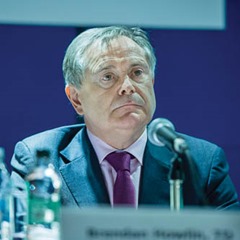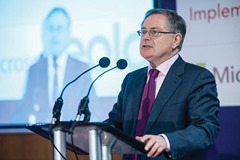The next phase
 Brendan Howlin has set out his ambitions for the next steps in Public Service reform with a stronger emphasis on outcomes and efficient service to the citizen.
Brendan Howlin has set out his ambitions for the next steps in Public Service reform with a stronger emphasis on outcomes and efficient service to the citizen.
Minister for Public Expenditure and Reform Brendan Howlin placed a “world class” Civil Service at the centre of his policy agenda up to 2016 when addressing eolas’ Public Service Reform Conference.
“We’re now entering a particularly challenging phase of reform,” Howlin stated. “With the troika gone, the temptation might be now to take our foot off the pedal. That would be a mistake – a mistake we don’t intend to make.”
Public Service reform was a “critical component” in meeting the challenges facing the State and “doing more with limited resources” will be relevant for the foreseeable horizon. “This will require creativity, innovation and determination,” he added. “There will be no going back to some of the practices of the old days.”
The public sector differs from the private sector as every citizen in the State is a stakeholder and its business and governance are transacted in public. It is therefore subject to much more criticism – “some of which is fair, some of which is not” – but this cannot be allowed to distract the sector from its core responsibility of “delivering better services to the people of Ireland.”
Constructive criticism “should spur us on to do better” and tax-payers should feel that the services for which they pay are worth that investment.
Effective public governance can also contribute to Ireland’s effectiveness and its attractiveness for business investment and job creation. “Efficient public services,” he noted, “impact upon taxation levels and on the State’s funding requirements.”
People Point – the Civil Service’s human resources shared service centre – is now serving 15,000 employees across 13 organisations. When fully operational, it will serve 40 organisations with estimated annual savings of €12.5 million.
The Office of Government Procurement has also been established with a target of €500 million savings over the next three years: €127 million in 2014 alone.
An efficiency action plan for the State’s property portfolio is being implemented. The Office of the Government Chief Information Officer is building on a strong performance in e-government.
Over 500,000 public service cards were issued in 2013 and 900,000 will follow this year. Social welfare payments, the travel pass scheme and other uses will be added over time.
The number of Public Service staff had been reduced by almost 10 per cent since its peak in 2008. Longer working hours, standardised arrangements for annual leave and sick leave, and an improved performance management framework had been introduced while maintaining stable industrial relations: “An achievement that hasn’t been replicated anywhere else in Europe.”
He highlighted the Croke Park and Haddington Road agreements as key enablers. Haddington Road aims to cut the pay and pensions bill by a further €1 billion by 2016 and add 15 million additional working hours annually: “That’s a real gain that has to be properly managed.”
The next phase of reform would continue to drive cost reductions but also have a stronger emphasis on the best outcomes for Ireland’s economy and society. Some savings will be re-invested in services – a “reform dividend” that would underpin and sustain the reform agenda “beyond the current crisis.”
Civil Service accountability was “one of the most critical elements” of reform: “We want an effective, high performing Civil Service that is responsive to the needs of a modern democracy, a Civil Service that is empowered to be more effective and perform better, and is better placed as a learning organisation.”
Accountability was a common phrase but its exact meaning was often unclear. More clarity on this, based on the public consultation, would strengthen the performance of both political representatives and senior civil servants.
“Every day, civil servants deliver many complex roles to support government and public services,” he noted, with these ranging from policy advice to overseas representation, regulation and (most often) supporting front-line services to the public.
This went on alongside the change agenda and the challenges of the troika programme. The head of the troika had told him that the Irish Civil Service’s performance was superior to those in several other European countries, including Germany.
The change programme was Civil Service-led and the taskforce would be holding a range of “open, honest and practical conversations” about its future. Every civil servant will be asked about what the Civil Service does well and what needs to change, both online and in ‘town hall meetings’.
“Achieving these goals will not be easy,” he commented in conclusion, “but I’m sure that my fellow public servants will once again show their commitment to the reform process as they have done for the last number of years, as we build a new Public Service: one that is better for citizens, better for businesses, better for public servants themselves and for society as a whole.”
Dividend
Speaking to eolas afterwards, Minister Howlin reiterated that “we’ve made the reductions and they’re bedded in on a permanent basis” and the next phase is to “see how we deliver services in a more efficient way.”
He added: “What I’m looking for now is to look at using the dividend of that because I don’t want to simply bank, in terms of debt reduction, all the savings.”
Re-investing the dividend would, for example, allow the State to employ 1,200 additional teachers.
“Certainly, we’ll have to keep a tight grip on expenditure but the focus will be more now on service delivery,” Howlin explained. In particular, he was looking at the top 20 services used by the public and how they could be provided more effectively online. “We will achieve our
3 per cent deficit,” he stressed. “It’s just a matter of constraint as opposed to reduction.”
Asked for one big thing on which he wanted to focus, Howlin replied: “I would love to think that we could actually restore public trust in the Public Service. I mean, that was broken and my objective is to restore public trust – and the means to do that is to have a confident, competent Public Service that delivers quality services on a world class basis.”






